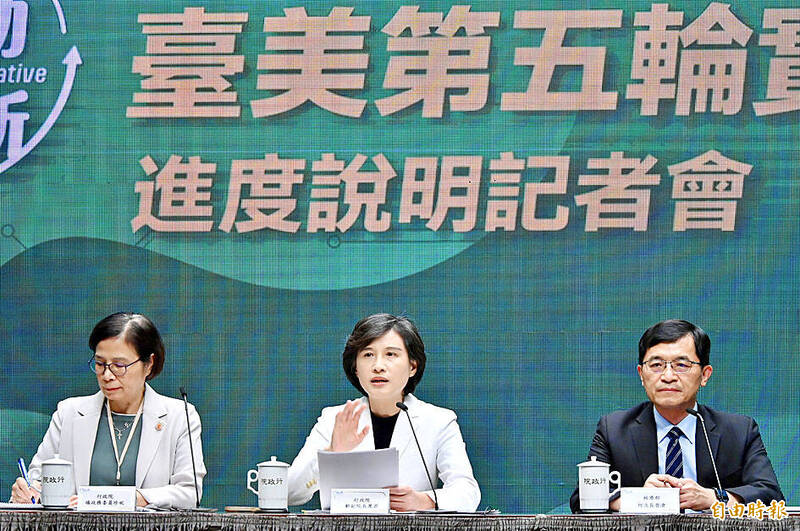Science
Taiwan Proposes High-Tech Partnership with US to Boost Investments

Taiwan is exploring the possibility of a high-tech strategic partnership with the United States, aimed at enhancing Taiwanese investments in the US. Vice Premier Cheng Li-chiun announced this initiative during a news conference in Taipei, outlining the discussions held with Washington to foster deeper economic ties.
Cheng highlighted that Taiwan, home to Taiwan Semiconductor Manufacturing Co (TSMC), the world’s largest contract chipmaker, maintains a significant trade surplus with the US. Currently, Taiwanese exports to the US are subject to a 20 percent tariff, a figure that Taiwan is actively seeking to reduce. Cheng, who is leading the ongoing tariff negotiations, expressed optimism about reaching an agreement that would not only lower tariffs but also expand investment opportunities in the US.
The proposed partnership would utilize what Cheng referred to as the “Taiwan model,” which focuses on enhancing production capacity in the US without relocating existing supply chains. Rather than simply moving operations, this strategy aims to extend and augment US manufacturing capabilities. Cheng explained that the model involves industrial investment planning supported by government measures like export credit guarantees and collaborative development of industrial clusters between the two nations.
Cheng stated, “The current negotiation focus is that the United States expects us to expand investments and engage in supply chain cooperation.” The “Taiwan Model” allows corporate stakeholders to select the specific industries for investment, with the Taiwanese government providing financial backing based on those choices. This plan includes establishing an investment insurance scheme to support local companies and mitigate risks associated with investment.
Although Taiwan’s science parks may not be entirely replicable elsewhere, Cheng affirmed the nation’s willingness to share its expertise to develop industrial clusters in the US. This collaboration aims to reduce investment risks and corporate overheads. She clarified, “This does not mean we are moving Taiwan’s science parks to the US,” emphasizing the importance of tailored support from the US, such as providing land, utilities, and legal frameworks.
In addition to supply chain discussions, Taiwan is negotiating tariff rates with the US. Cheng reiterated Taiwan’s position that tariff rates would not be cumulative and mentioned ongoing talks regarding preferential tariffs for semiconductors and related products, as detailed under Section 232 of the US Trade Expansion Act of 1962.
Both the US Department of Commerce and the Office of the US Trade Representative have not provided comments on the ongoing negotiations. TSMC is poised to make significant investments, amounting to $165 billion, in new chip factories located in Arizona. Despite this, Cheng noted that the majority of TSMC’s production would continue to be based in Taiwan.
Cheng also addressed a proposal circulated in US media by US Secretary of Commerce Howard Lutnick regarding a “50-50 split” in chip production, stating that Taiwan would not accept this arrangement, nor was it discussed during the latest negotiations. The goal remains to keep Taiwan’s industry rooted domestically while fostering global partnerships.
As negotiations progress, Taiwan has outlined three primary objectives: reducing the tariff rate, securing comprehensive preferential treatment for semiconductors and related goods, and enhancing investment opportunities within the US. The current US tariff policy, effective since August 7, 2023, has established Taiwan’s tariff rate at 20 percent. This year has already seen five rounds of discussions, starting with a video conference on April 11 and continuing through various meetings, the latest of which occurred last week.
Through ongoing dialogue and collaboration, Taiwan aims to solidify its position as a key player in the global high-tech landscape while fostering strong economic ties with the United States.
-

 World5 months ago
World5 months agoSouth Korea’s Foreign Minister Cho Hyun to Visit China This Week
-

 Business5 months ago
Business5 months agoStarling Bank Plans Secondary Share Sale, Targeting $5.4 Billion Valuation
-

 Top Stories5 months ago
Top Stories5 months agoMunsang College Celebrates 100 Years with Grand Ceremony
-

 World5 months ago
World5 months agoPAS Aims to Expand Parliamentary Influence in Upcoming Election
-

 Business7 months ago
Business7 months agoKenvue Dismisses CEO Thibaut Mongon as Strategic Review Advances
-

 Lifestyle6 months ago
Lifestyle6 months agoHumanism Camp Engages 250 Youths in Summer Fest 2025
-

 Sports6 months ago
Sports6 months agoDe Minaur Triumphs at Washington Open After Thrilling Comeback
-

 Sports7 months ago
Sports7 months agoTupou and Daugunu Join First Nations Squad for Lions Clash
-

 Top Stories7 months ago
Top Stories7 months agoColombian Senator Miguel Uribe Shows Signs of Recovery After Attack
-

 World7 months ago
World7 months agoASEAN Gears Up for Historic Joint Meeting of Foreign and Economic Ministers
-

 Health6 months ago
Health6 months agoNew Study Challenges Assumptions About Aging and Inflammation
-

 Business7 months ago
Business7 months agoOil Prices Surge Following New EU Sanctions on Russia









